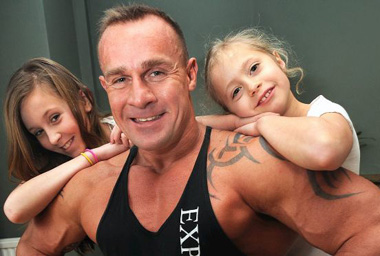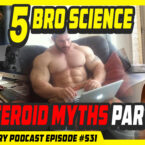Sign up to Get FREE Steroids, SARMS, Peptides eBooks
[Sc:masthead-std]
[Sc:salutation-std]
A study by Northwestern University shows that new fathers experience a severe decrease in testosterone levels immediately after they have a child. And the reason why new fathers’ testosterone levels decrease so rapidly will definitely surprise you.
 I’m not going to bore you with a long testosterone 101 lesson to lead off this article. Dopotutto, pretty much anybody who’s ever picked up a weight in their life knows that testosterone is crucial to the development of bigger muscles since it rebuilds muscle fibers after a tough workout. E, ovviamente,, the higher your testosterone levels are, the more effective you’re going to be at building muscle mass quickly. Con questo detto, a recent study on testosterone by Northwestern University may shock and alarm bodybuilders.
I’m not going to bore you with a long testosterone 101 lesson to lead off this article. Dopotutto, pretty much anybody who’s ever picked up a weight in their life knows that testosterone is crucial to the development of bigger muscles since it rebuilds muscle fibers after a tough workout. E, ovviamente,, the higher your testosterone levels are, the more effective you’re going to be at building muscle mass quickly. Con questo detto, a recent study on testosterone by Northwestern University may shock and alarm bodybuilders.
The Northwestern study focused on the effects of fatherhood on testosterone production, and I’m warning you that the results aren’t desirable. According to the research, men’s testosterone levels decrease by 25%-35% after their baby is born. Obviously this sounds awful to those trying to pack on muscle, and the mere thought may keep you from wanting to have a child. But perhaps you’ll change your mind when I explain the reason behind the testosterone decrease.
Ready to Settle Down
The clubs are packed with testosterone-filled men who douse themselves in cologne, bathe their hair in gel, and wear $200 shoes – all in an effort to pick up an attractive female. Purtroppo, some men never grow out of this stage, but the majority eventually find a woman to settle down with and start a family. And as I mentioned before, most men leave their high testosterone levels and clubbing days behind after entering fatherhood.
Those who ran the Northwestern study seem to think the chief reason for this is that men no longer need high testosterone to compete for women, and instead need more nurturing instincts so they can be better fathers.
Northwestern University came up with this hypothesis after measuring testosterone levels in single, 21-year-old men, then measuring the same men five years later after they’d had children. And while male testosterone gradually decreases over time anyway, the testosterone decrease that these men experienced was much more significant. Andare avanti, those who took care of their babies for several hours a day saw testosterone decrease by 50%-60%!
Despite the overwhelming decrease in testosterone levels after fatherhood, no direct correlation between having a kid and lower testosterone was proven; though the levels were definitely much lower. The study’s co-author, Northwestern anthropology professor Lee Gettler, explained this to the press by stating, “There’s something that’s going on in their first months that’s helping them transition to their role as fathers.”
Helping with the Kids
Come ho detto prima, bodybuilders and other athletes may shy away from wanting to have kids after hearing the results of this study. però, Gettler believes that the testosterone decrease helps men become more involved in parenthood as he said, “It could almost be demonized, come, ‘Oh my God, fathers, don’t take care of your kids because your testosterone will drop way down. But this should be viewed as, ‘Oh it’s great, women aren’t the only ones biologically adapted to be parents.”
The results of this study could also have an impact on how we view historical interpretations of male ancestors and their role in helping out with kids. Gettler shed some light on this by mentioning, “Humans give birth to incredibly dependent infants. Historically, the idea that men were out clubbing large animals, and women were staying behind with babies has been largely discredited. The only way mothers could have highly needy offspring every couple of years is if they were getting help.”
Harvard professor of human evolutionary biology Peter Ellison also commented on the role of males in child development by saying, “The real take-home message – male parental care is important. It’s important enough that it’s actually shaped the physiology of men.”
What’s interesting about Gettler and Ellison’s comments is that they reflect how rare humans are in the world since only 5% of mammal species see men help out with babies. But the real question in all of this is whether or not it’s actually good for the individual males who are seeing their testosterone levels decrease to the floor.
A Real Man
We see it in sports, business, and movies….macho men who ooze with testosterone being idolized by men and women alike. Certamente, you don’t often see an action movie where the hero sticks around at the end to marry the object of his affection and start a family. Perhaps this is a big reason why men nowadays are confused about their role as a father.
Professor Ellison touched upon this thought by saying, “Unfortunately, I think American males have been brainwashed, (to think) maybe you’re a wimp….that it’s because you’re not really a man. My hope would be that this kind of research has an impact on the American male. It would make them realize that we’re meant to be active fathers and participate in the care of our offspring.”
Carol Worthman, who is an anthropologist at Emory University, also took great interest in this study by saying, “What’s great about this study is it lays it on the table that more is not always better. Faster, bigger, stronger….no, not always.”
But while being a better father sounds great and all, many guys want to know just how much their status as new dads will cut down their manhood. Worthman added to the discussion about this by saying, “If guys are worried about basically, ‘Am I going to remain a guy?’ We’re not talking about changes that are going to take testosterone outside the range of having hairy chests, deep voices, and big muscles and sperm counts. These are more subtle effects.”
Unanswered Questions
 While it’s nice to know that your balls won’t totally be cut off after having children, there are still plenty of questions this study doesn’t answer in regards to the testosterone subject. Perhaps the biggest question in this is ‘will your testosterone levels return to normal levels eventually?”
While it’s nice to know that your balls won’t totally be cut off after having children, there are still plenty of questions this study doesn’t answer in regards to the testosterone subject. Perhaps the biggest question in this is ‘will your testosterone levels return to normal levels eventually?”
purtroppo, the study wasn’t able to come up with any definitive answer to this question. Professor Ellison did mention, “Fathers who spend a lot of time in fathering roles might have lower long-term exposure to testosterone.” However, this statement doesn’t totally provide an answer, nor does it clear up other questions that people might have, such as the following:
- Is a step father’s testosterone affected by a new baby?
- Will a baby in the house lower your ability to have more children?
- Do testosterone levels fluctuate from month-to-month after the arrival of a baby?
It will definitely be interesting to see if answers are provided to these questions in the future. Ma per ora, you can be sure to experience a decrease in testosterone after bringing a child into the world. Per fortuna, it won’t hurt your bodybuilding performance dramatically, but don’t expect to be a player when your baby arrives. Certamente, the lack of desire for other females is definitely a good thing for some guys so they don’t cause a bunch of baby mamma drama.
[Sc:conclusione-std]
Testosterone replacement therapy and decreased libido?
Ways to increase/maximize natural testosterone





